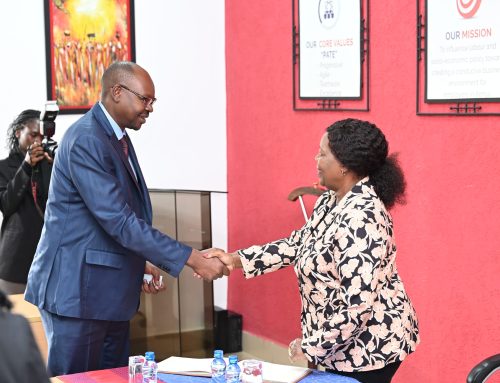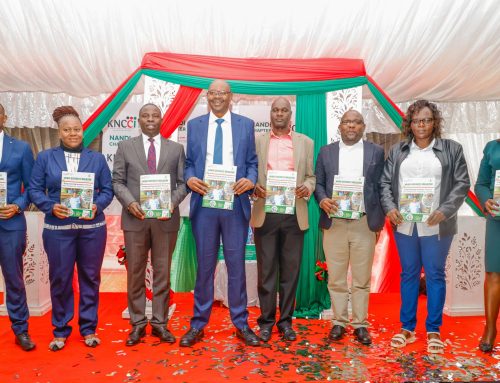Skip to content
IMPACT OF COVID-19 PANDEMIC ON INTERNATIONAL TRADE
REPORTING BRIEF
- The Coronavirus (COVID-19) has resulted in mass production shutdowns and supply chain disruptions due to various port closures causing global ripple effects across all economic sectors.
- Africa is now feeling the economic impact of the virus and plans to control and manage the challenges of COVID-19 are underway across the continent. Economically, the effects have already been felt in that demand for Africa’s raw materials and commodities has declined and Africa’s access to industrial components and manufactured goods from the region has been hampered. Adding to the supply chain challenges are the travel restrictions that have been imposed by several African countries. This is causing further uncertainty in a continent already grappling with widespread geopolitical and economic instability.
- The Kenya National Chamber of Commerce and Industry (KNCCI) I collaboration with representatives from various stakeholders, on April 29, 2020 held a webinar and open discussion to deliberate on the Impact of Corona Virus pandemic on international Trade.
- The panelists for this session were: Mr. Robin George-Partner and Associate, Director, The Boston Consulting Group, Mr. Mark Priestley, Senior Director, Trade Logistic Cluster, Trademark East Africa, Mr. Job Wanjohi, Head of Policy and Research, Kenya Association of Manufacturers, Mr. William W Zhou, Chairman, Kenya Chinese of Commerce and Mr. Michael Gathu, Chief Executive Officer, Dubai Chamber of Commerce Kenya. The session was moderated by KNCCI President. Mr. Richard Ngatia.
- In light of this, the discussions revolved around the following key agenda items:
- The Impact of Covid-19 on foreign trade.
- How countries can promote and reposition themselves for foreign direct investment opportunities in the post Covid 19 period.
- Supportive role Chambers play in promoting international trade in this covid 19 crisis
- Post Covid-19 trade facilitation measures
- How to strengthen and stabilize supply chain and cross boarder businesses during this crisis
- How Africa can accelerate and build manufacturing and industrial transformation agenda in post covid 19 period
- Practical steps countries can employ to support post covid 19 economic recovery and resilience mechanism.
- The Impact of Covid-19 on foreign trade.
- There is no doubt that the pandemic has resulted in a very large cut in foreign trade as a result of falling global demand, both for economically, for consumption as well as investments.
- Global trade in 2015 to 2018 improved significantly from 15. 7 trillion USD to 18.2 trillion USD, evidenced in key continental blocs, that is USA – EU and ASIA -EU, however, Arica did not benefit much from it.
- In his opening remarks, Partner and Associate Director, the Boston Consulting Group said that global trade is likely to decline significantly for the next 3 to 4 years, with recovery probably picking up in 2023.
- According to World Trade Organization (WTO) global trade volumes are projected to decline between 13% and 32% in 2020
- The Boston Consulting Group modelling suggests that GDP growth rate is likely to fall back up to between 1% to 6% as a result of the economic impact of covid 19.
- How countries can promote and reposition themselves for foreign direct investment opportunities in the post Covid 19 period.
- In his remarks, Michael Gathu, CEO Dubai Chamber of Commerce Kenya stated that the pandemic has impacted heavily on Foreign Direct Investment, disruption of supply chain, evaluation of companies and job cuts. However, governments have established economic stimulus to support businesses.
- He went on to say, for counties to be able to reposition themselves for post covid 19, there is need for governments and private sectors to rethink on key responsive sectors that could boost the economy across the globe. This however, may depend on the response rate of each country’s covid 19 measures and mechanisms.
- Supportive role Chambers play in promoting international trade in this covid 19 crisis
- The coronavirus (COVID-19) is a global economic crisis impacting or threatening to impact businesses all over the world. Chambers of Commerce as trusted institutions around the globe, private sector partner to business, governments and international organizations are working tirelessly by developing tools for business and policymakers, in line with its commitments to help chart an effective international response to promote international trade during this pandemic.
- Speaking during the virtual meeting, Mr. William Zhou, Chairman Kenya Chinese Chamber of Commerce said that, the Chinese Chamber is working closely with KNCCI and other organizations to provide alternative markets, market information, establishment of cooperative networks, supporting key sectors i.e Tourism, Cultural Heritage and Manufacturing and support Kenya in exporting and importing from China to continue supporting international trade.
- To combat the potential surging demand for medical supplies and equipment in Africa, the Chinese Chamber of Commerce Kenya in collaboration with the Chinese Embassy and medical institutions has donated masks, and Patient Protection Equipment (PPEs) to those in need.
- Post Covid-19 trade facilitation measures
- Mark Priestley, Senior Director Trade Logistics Clusters, Trademark East Africa said that through Trademark East Africa’s Safe Trade Emergency Facility, The UK and other partners are supporting hygiene measures and technology to ensure supplies, including food and medicines can continuously flow through boarders and ports.
- Trademark East Africa is also looking at innovative ways to link suppliers to buyers through e-commerce to ensure that the supply chain is not disrupted.
- Trademark East Africa has put in place the following measures:
- Diversification supply chain to help reboot the economy
- Introduction of tracking apps to enable them track all trucks that supply essential services and to also reduce friction at the boarder by ensuring that the truck drivers are corona free.
- Raisin awareness along critical supply chains
- Putting safety mechanisms along the critical supply chain
- Development of Special Economic Zones and Industrial Parks to provide place for textiles and garments sectors to be located in these zones.
- Have a targeted set intervention to support key export sectors and supply chains, ie Horticulture, logistics, ICT, E-commerce and Tourism.
- How Africa can accelerate and build manufacturing and industrial transformation agenda in post covid 19 period
- Mr Job Wanjohi highlighted that Africa is a bit challenged in terms of competitiveness in trade and manufacturing in Africa imports around 80% of their inputs and there is a need to adapt import substitution programs. He said that Africa is looking on how it can sustain the production through Value chain integration from sourcing of raw materials to local manufacturing to sourcing of African markets leading to a lot of investments and job creations.
Share This Story, Choose Your Platform!







Leave A Comment